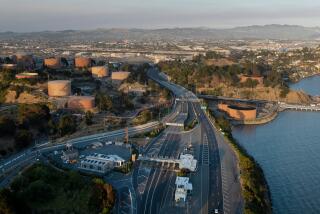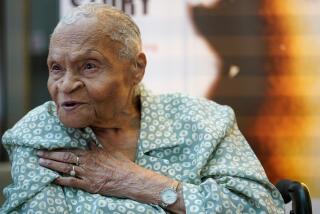Chevron seeks reimbursement from villagers who sued over 1998 shooting
- Share via
SAN FRANCISCO — Chevron Corp., which prevailed in a human-rights lawsuit seeking to hold it responsible for the shooting of Nigerian protesters at an oil platform, is seeking nearly $500,000 in legal costs from the villagers who brought the suit.
Chevron’s claim for reimbursement, filed in federal court, includes $190,000 in copying charges. The San Ramon-based company, which posted a record $23.8-billion profit for 2008, says it is entitled to the money because a nine-member jury decided in the company’s favor in December.
Lawyers for the villagers had sought to hold the oil giant responsible for the 1998 shooting and mistreatment of protesters by Nigerian soldiers at the Parabe oil rig off the coast of Nigeria. They have filed an appeal in the case, which is scheduled to be heard next month.
Advocates and lawyers for the Nigerians said they were outraged by Chevron’s attempt to seek money from the plaintiffs, including one who was shot and wounded, another who was arrested and tortured and others whose husbands or fathers were killed.
Laura Livoti, founder of Bay Area-based Justice in Nigeria Now, said the $485,000 sought by Chevron, California’s largest company, would constitute a fortune for the Nigerians. That sum would be enough to sustain at least four villages in the Niger Delta for a year, she said.
“Chevron’s attempt to squeeze nearly half a million dollars out of poor villagers who don’t even have access to clean drinking water and who had wanted jobs with the company is a dramatic illustration of Chevron’s heartlessness,” she said.
In its claim, Chevron is seeking reimbursement from 19 plaintiffs and 30 former plaintiffs who dropped out of the case before it went to trial. At least a dozen of those named are children, Livoti said.
Morgan Crinklaw, a spokesman for Chevron, said the company had spent a significant amount of money on the lawsuit and was entitled to reimbursement. “Chevron is exercising its legal right to recover a portion of the costs we were forced to incur from responding to 10 years of litigation, and to comment any further, before the judge has ruled on this motion, would be inappropriate,” he said.
Bert Voorhees, who represented the Nigerians at trial, said Chevron’s goal was not necessarily to collect money from the plaintiffs but to deter others from pursuing similar suits.
“They are trying to bring this cost bill as a warning to any other folks who might seek justice,” the L.A. lawyer said. “My assumption is that it’s punitive and it’s designed as a shot across the bow of any would-be plaintiffs in the future.”
The lawsuit was brought under the 1789 Alien Tort Statute, which was signed by President Washington. Rarely used, the law increasingly has become a vehicle for activists attempting to hold U.S. corporations accountable for their actions overseas.
Survivors of the 1998 incident at the Parabe rig argued that Chevron was responsible because it paid the police and soldiers and flew them by helicopter to the platform, where they shot and killed two unarmed protesters and wounded two others.
Chevron countered during the trial that the villagers were holding its workers hostage and that the company acted responsibly by calling in the authorities.
The Nigerians and their lawyers say that Chevron’s oil operations caused extensive environmental harm in much of the delta, ruining farmland and the fishery. They argued in court that the villagers who went to the oil platform staged a peaceful protest in an attempt to win jobs and compensation for the damage.
“Chevron has already impoverished these people due to its lousy environmental practices in the area,” Voorhees said. “Stealing their livelihood wasn’t enough, stealing their lives wasn’t enough. Now they are seeking half a million too.”
--
More to Read
Sign up for Essential California
The most important California stories and recommendations in your inbox every morning.
You may occasionally receive promotional content from the Los Angeles Times.










